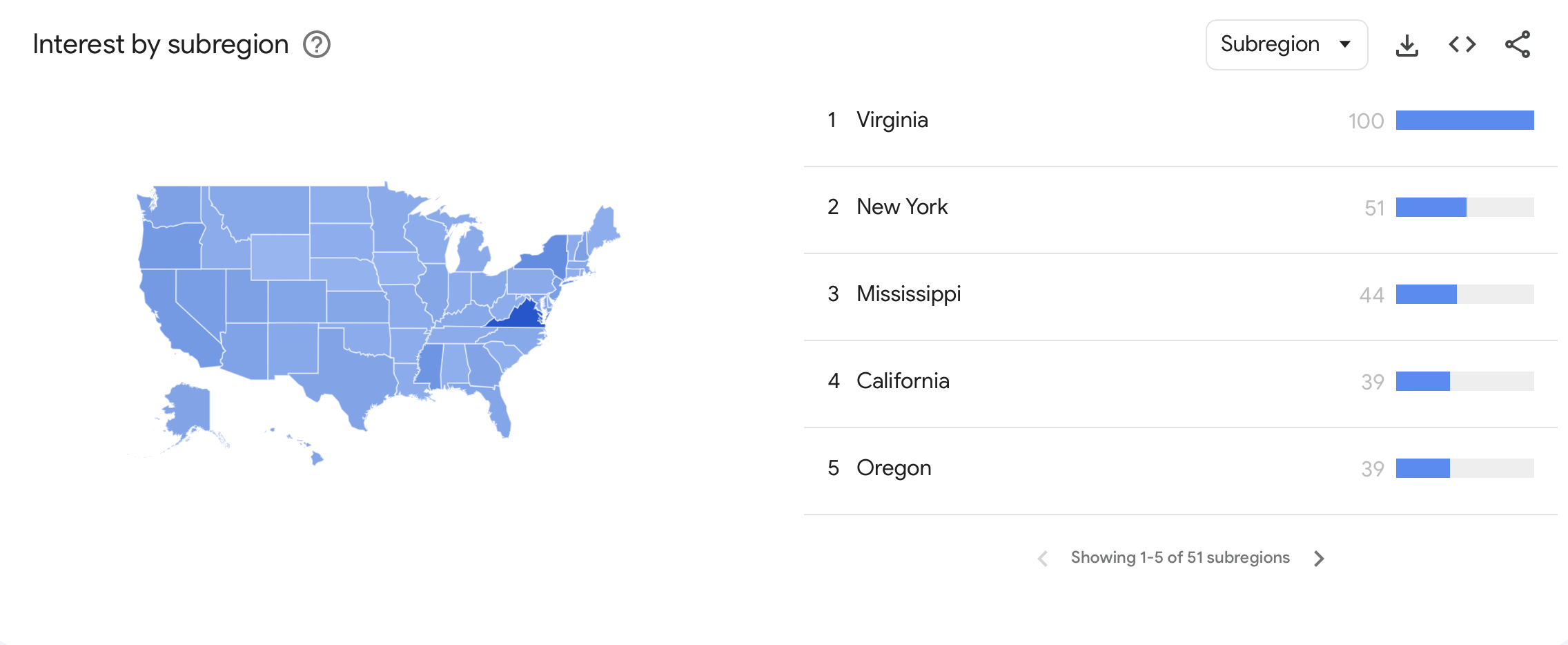On July 1, sites that display adult content will have to check the ages of people in Virginia who access them. Pornhub has blocked users in Virginia. And perhaps not coincidentally, Google Trends data show that Virginia is now the top state in the U.S. for searching for information about virtual private networks, or VPNs.

Virginia state Senator Bill Stanley, who sponsored the bill, is on vacation this week, his law office told Washingtonian when we called to ask for comment. In the past, he’s spoken about protecting children from adult material and said he was “pretty confident” that age-verification services would not “put users’ personal information at risk.” The office of Virginia’s attorney general, Jason Miyares, didn’t respond to a request for clarification but the law doesn’t appear designed to be enforced by the state: It appears to create a “private right of action” that would allow individual litigants to sue if they felt they, or more likely their children, had been harmed by viewing such content online.
The sudden interest in VPNs—services that encrypt users data online, masking information like one’s location—isn’t a surprise to Mike Stabile, a spokesperson for the Free Speech Coalition, a trade group for the adult-entertainment industry. “A lot of this is magical thinking,” he says of age-verification laws in Virginia, Utah, and Louisiana. Virginia doesn’t have a statewide digital-ID system like Louisiana does, and while independent age-verification systems do exist, they’re geared toward people who are uploading adult material and are expensive and intensive.
Consumers, Stabile says, are often hesitant to use such services because they worry about privacy—few people are wild about the idea of uploading a photo of their driver’s license to any website, he argues. And besides being easy to get around, laws like Virginia’s will drive users toward sites based outside the US that don’t have to worry about them. The cost of verification can be exorbitant for platforms that want to comply—in Louisiana, verification costs about 65 cents per user, which comes to $650,000 per month for a site with a million users. “That’s a business-ending cost,” he says. Traffic to adult sites in Utah and Louisiana has dropped to “single digit percentages of what it was before.”
He argues that chilling effect is likely the point: Virginia’s law “sailed through” the General Assembly before it was signed by Governor Glenn Youngkin, Ben Paviour reports for the public media newsroom VPM. Few lawmakers, Stabile says, want to be seen as being “on the side of adult content producers or pornography.” But, he adds, “The sad fact is that pornography is the canary in the coal mine of free speech.” Virginia’s law is written so broadly, he says, that it could sweep up sex educators or even journalists who run afoul of its provisions.
Alison Boden, the executive director of the Free Speech Coalition, wrote a letter to Youngkin in March to oppose the bill and to propose what the group thinks is a better solution: Device-level filters whose parameters parents can adjust themselves. “We don’t want minors on our sites,” Stabile says. “People who are creating [adult] content don’t want their own minors to see them.”
His group has sued over the similar laws in Louisiana and in Utah, and Stabile says “certainly we’re looking at Virginia as well.” Stanley has said he would “rather try and have a Supreme Court tell me I was wrong than not to try at all.” Stanley says that’s a likely scenario: Lawmakers, he says, are “willing to spend a million dollars of taxpayer money to defend a law that they know is unconstitutional” if it means sticking it to porn sites.
And, if you’re looking for a decent VPN, the Wirecutter has a couple recommendations.

















